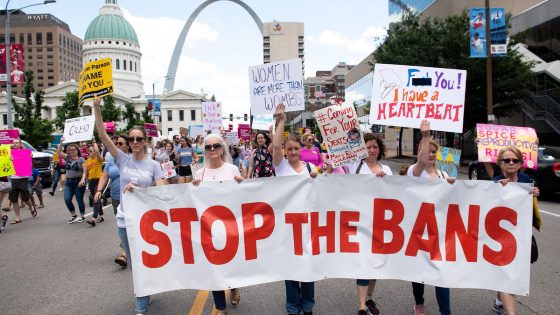Abortion rights ballot measures in Nebraska and Missouri are facing legal challenges ahead of looming certification deadlines.
Missouri Judge Christopher Limbaugh on Friday ruled against an abortion rights ballot measure in the state, agreeing with a lawsuit that alleged the “petition violated state law by failing to provide voters with a list of Missouri laws that would be repealed, directly or by implication,” should it pass.
The proposed measure aimed to enshrine the right to an abortion in the state’s constitution, prohibiting any government interference related to the procedure.
Missouri organizers behind the ballot measure are hoping to appeal Limbaugh’s decision in front of the state Supreme Court on Tuesday to stop an injunction — but Tuesday is also the deadline for ballot changes. If the court decides not to intervene, then an injunction would go in place, officially striking the ballot measure.
“The court’s decision to block Amendment 3 from appearing on the ballot is a profound injustice to the initiative petition process and undermines the rights of the 380,000 Missourians who signed our petition demanding a voice on this critical issue,” Rachel Sweet, campaign manager for Missourians for Constitutional Freedom, said in a statement.
Abortion is illegal in Missouri with exceptions relating to the life and health of the mother.
In Nebraska, which has a 12-week abortion ban, two dueling abortion petitions were set to appear before voters this November — but it is now unclear if voters will be given either option.
One measure would provide a fundamental right to an abortion until fetal viability, but it is facing legal challenges over whether it meets the single-subject requirement.
A competing ballot measure would prohibit abortion in the second and third trimester, “except when a woman seeks an abortion necessitated by medical emergency or when the pregnancy results from sexual assault or incest.”
On Monday the Nebraska Supreme Court heard oral arguments about the lawsuits.
“We think the rights amendment clearly qualifies under the single subject test. We think the restrictions amendment probably does as well under this Court’s jurisprudence. However, if the Court were to apply a more tightly focused, stricter approach to the single subject test, as urged by the relators in the prior case, we think that the restrictions amendment clearly would fail that test far, far before the rights amendment would,” Attorney David Gacioch argued.
The deadline to certify ballots in Nebraska is Sept. 13.
Abortion has become a potent political issue since the U.S. Supreme Court’s Dobbs decision that overturned Roe v. Wade, ending federal protections for the procedure and making it a state issue.
Statewide ballot measures in support of the procedure have since seen success, and this November similar measures will appear before voters in Arizona, Nevada, Florida, South Dakota, Colorado, New York, Maryland and Montana.
Democrats have rallied around abortion rights, and the fight for reproductive freedom has become a central pillar for the campaign of Vice President Kamala Harris campaign.
On the campaign trail, Harris has repeatedly said that former president Donald Trump will sign a national abortion ban into law. Trump insists he supports the issue being left to the states, and while he called the six-week ban in Florida “too short” of a time period, he still announced his plans to vote against a ballot measure that would prohibit restrictions on the procedure up until fetal viability.
Source Agencies




